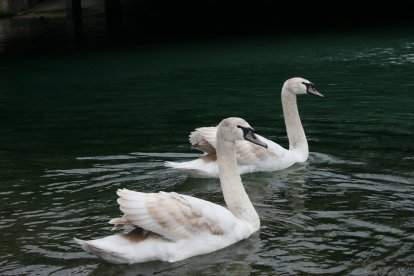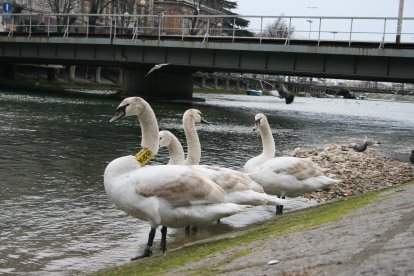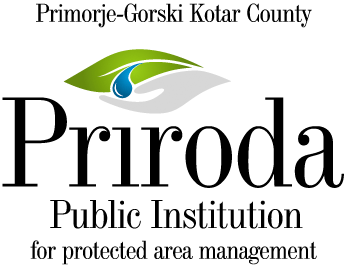
Photo: Andrej Radalj
SWANS RINGED ON THE RJEČINA RIVER AT HOTEL KONTINENTAL
On 8 and 9 March 2010, Mr. Andrej Radalj and Mr. Kristian
Mandić, licensed ringers of the Institute of Ornithology and external
associates of the Public Institution “Priroda”, ringed and fitted
with yellow neck-collars two (a male and a female) of the four mute swans
(Cygnus olor) wintering on the Rječina River near the Hotel Kontinental.
Because most people strolling along the banks or bridge of the Rječina
River have noticed the large, yellow neck-collars on these magnificent
birds, it doesn’t hurt to write a few words of this method of marking
and monitoring birds. Ringing birds with metal (and sometimes plastic)
leg rings has a long tradition, and it is the more widespread method of
monitoring the life, movement (wandering and migration), behaviour, longevity,
territoriality and other interesting aspects of birds. Caught birds are
marked with a ring with a unique combination of letters and numbers. When
a bird is recaptured or found dead, the ring makes it possible to identity
the specimen, and when and where it was ringed. Since recently, long-necked
birds, such as swans and geese, are marked with wide, plastic neck-collars
in addition to leg rings. In no way does the neck-collar impede a bird’s
ability to swallow, move around or fly. The advantage of the neck-collar
over the leg ring is that it is easier to read at greater distances, especially
with binoculars. In this way, it is not necessary to recapture a bird
to read the data on its leg ring, making it easier on the bird as it is
less exposed to discomfort and stress. In the first few days after a bird
has been tagged with a neck-collar, it will perhaps try to remove it.
After several days, it will become completely accustomed to it and will
carry the neck-collar for a number of years. The female swan tagged on
the Rječina River carries a neck-collar with the marking 83PA, and the
male swan, the marking 85PA. The swam-ringing scheme on the Rječina River
continues…
Should you find or sight a ringed bird, please report
the ring number, as well as the sighting date and place to the Institute
of Ornithology, Croatian Academy of Science and Arts, 10000 Zagreb; tel:
01 4825-400 or 01 4825-401, e-mail: zzo@hazu.hr. Should you sight a ringed
bird in the territory of Primorsko-Goranska County, please report the
information to the Public Institution “Priroda”, and we will
forward it to the Institute of Ornithology.

Photo: Andrej Radalj



